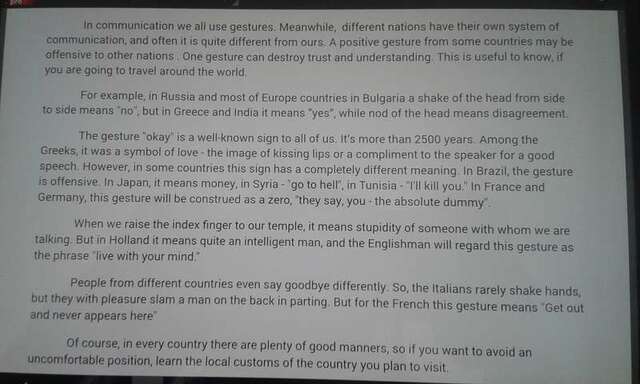In communication we all use gestures. Meanwhile, different nations have their own system of communication, and often it is quite different from ours. A positive gesture from some countries may be offensive to other nations . One gesture can destroy trust and understanding. This is useful to know, if you are going to travel around the world. For example, in Russia and most of Europe countries in Bulgaria a shake of the head from side to side means "no", but in Greece and India it means “yes”, while nod of the head means disagreement. The gesture "okay" is a well-known sign to all of us. It’s more than 2500 years. Among the Greeks, it was a symbol of love - the image of kissing lips or a compliment to the speaker for a good speech. However, in some countries this sign has a completely different meaning. In Brazil, the gesture is offensive. In Japan, it means money, in Syria - "go to hell", in Tunisia - "I'll kill you." In France and Germany, this gesture will be construed as a zero, "they say, you - the absolute dummy". When we raise the index finger to our temple, it means stupidity of someone with whom we are talking. But in Holland it means quite an intelligent man, and the Englishman will regard this gesture as the phrase "live with your mind." People from different countries even say goodbye differently. So, the Italians rarely shake hands, but they with pleasure slam a man on the back in parting. But for the French this gesture means "Get out and never appears here" Of course, in every country there are plenty of good manners, so if you want to avoid an uncomfortable position, learn the local customs of the country you plan to visit.
